36+ SAMPLE Advisory Agreement
-
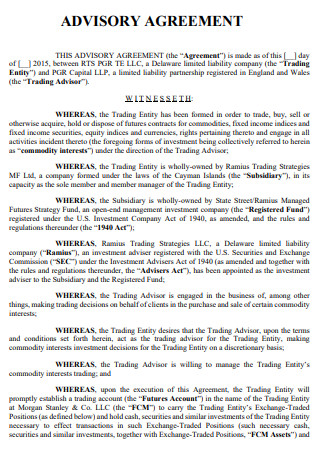
Advisory Agreement
download now -
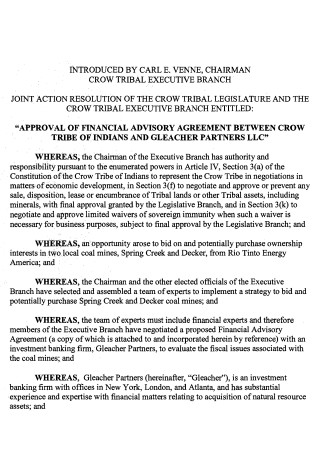
Financial Advisory Agreement
download now -
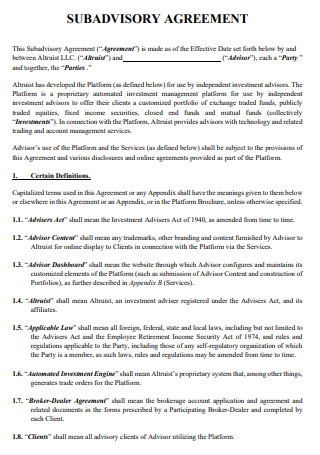
SubAdvisory Agreement
download now -
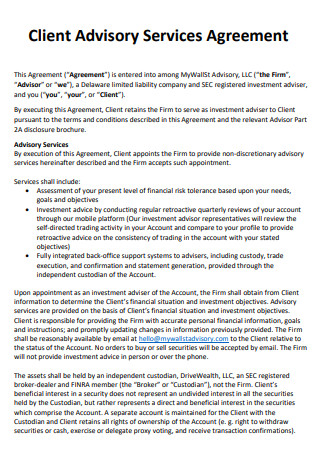
Client Advisory Services Agreement
download now -
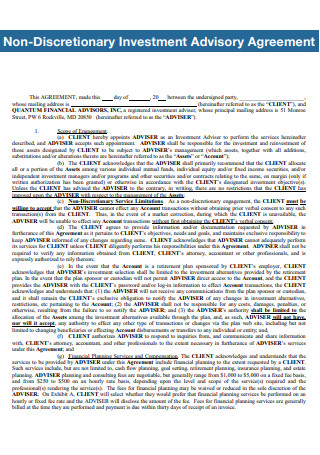
Non-Discretionary Investment Advisory Agreement
download now -
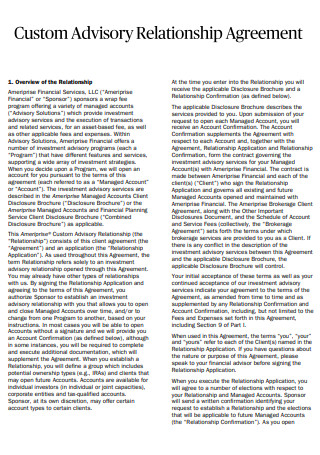
Custom Advisory Relationship Agreement
download now -
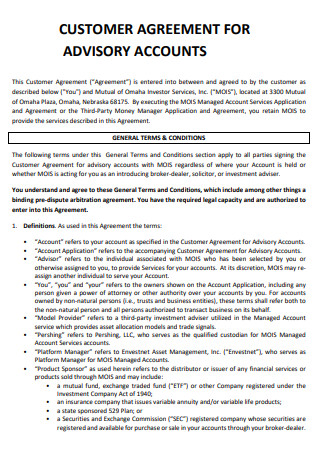
Customer Agreement Advisory Accounts
download now -
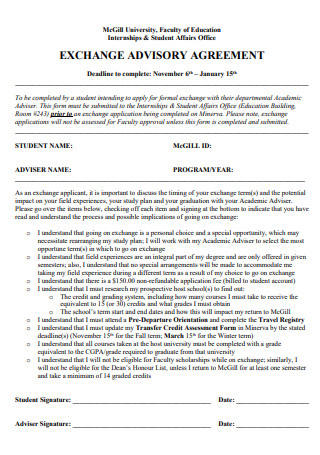
Exchange Advisory Agreement
download now -
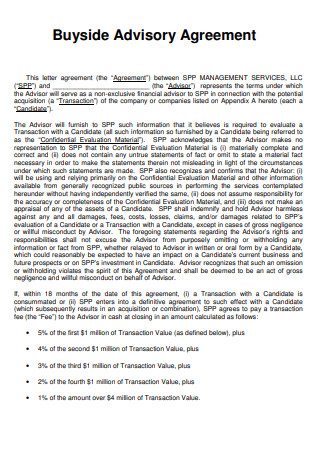
Buyside Advisory Agreement
download now -
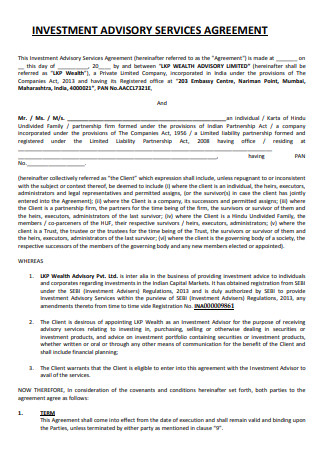
Investment Advisory Service Agreement
download now -
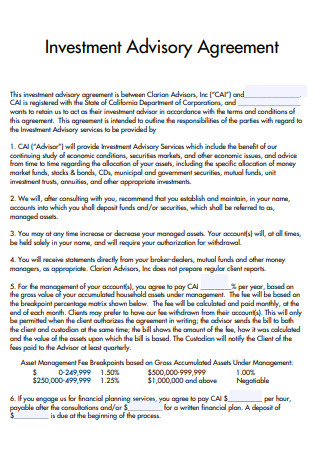
Investment Advisory Agreement
download now -
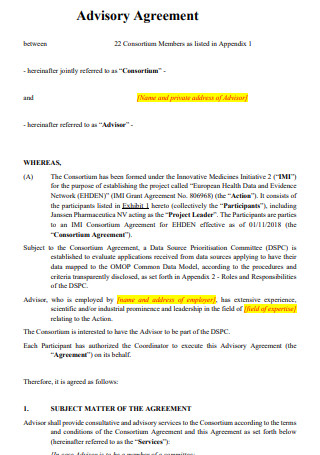
Sample Advisory Agreement
download now -

SImple Advisory Agreement
download now -
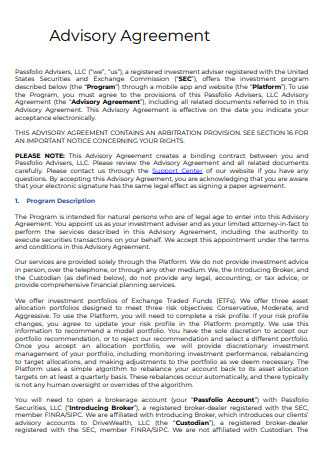
Basic Advisory Agreement
download now -
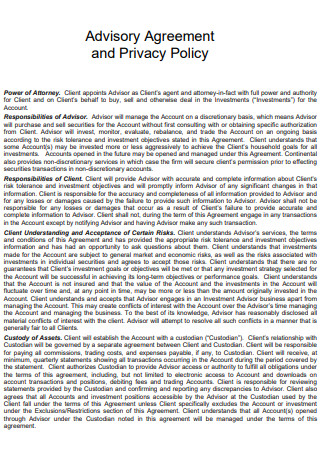
Advisory Agreement and Privacy Policy
download now -
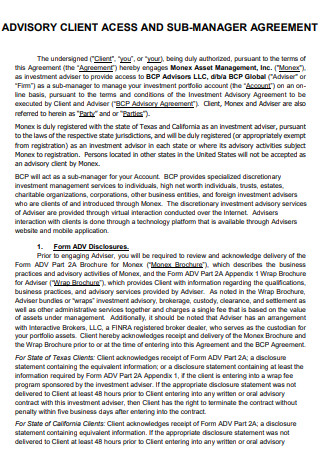
Advisory Client Acess and Sub Manager Agreement
download now -
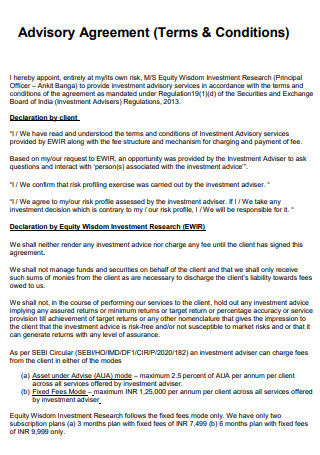
Advisory Agreement Terms & Conditions
download now -
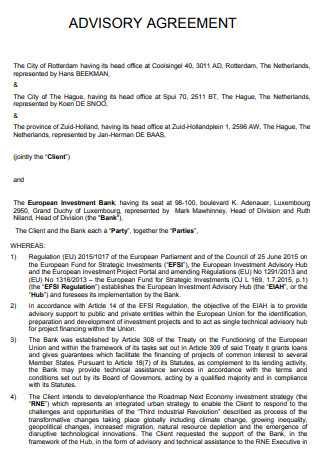
Draft Advisory Agreement
download now -
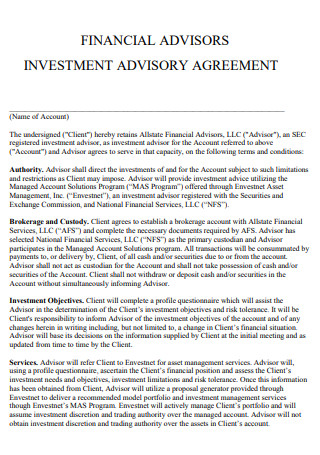
Financial Advisors Advisory Agreement
download now -
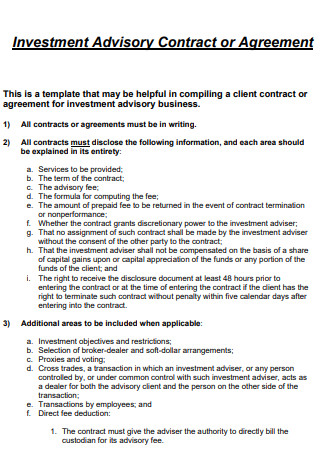
Investment Advisory Contract Agreement
download now -
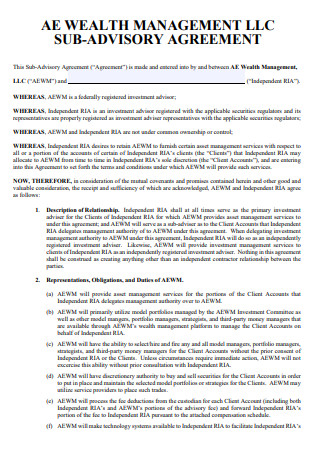
Wealth Management Sub Advisory Agreement
download now -
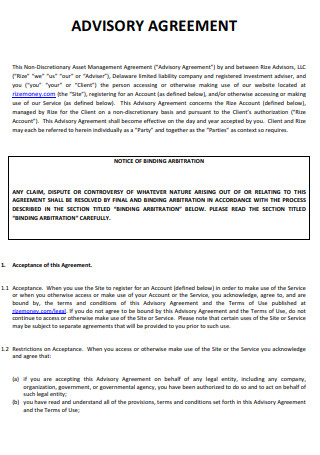
Asset Advisory Agreement
download now -
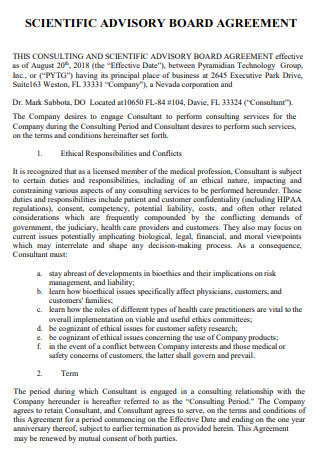
Scientific Advisory Board Agreement
download now -
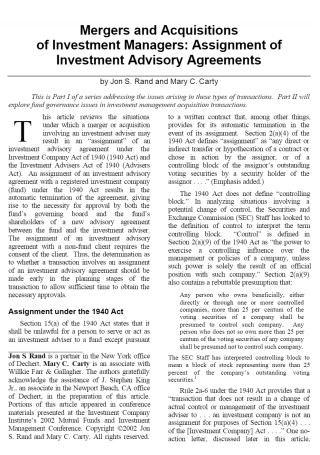
Assignment of Investment Advisory Agreement
download now -
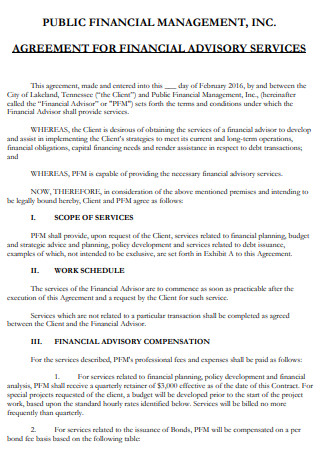
Public Financial Advisory Services Agreement
download now -
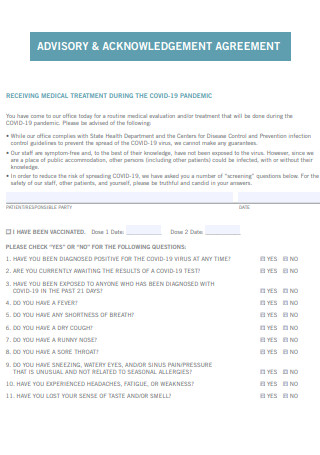
Advisory Acknowledgement Agreement
download now -
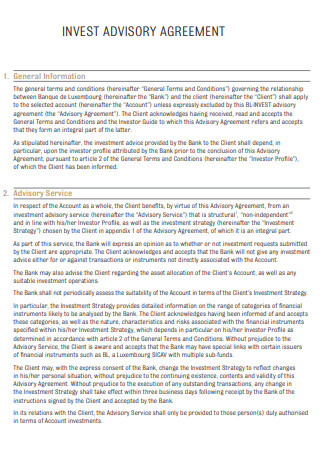
Invest Advisory Agreement
download now -
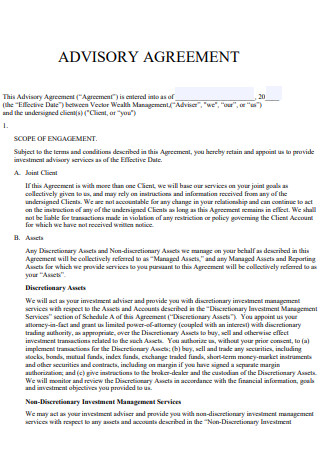
General Advisory Agreement
download now -
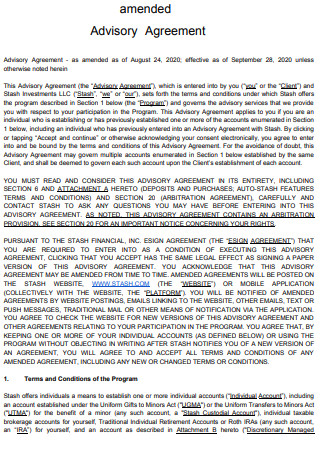
Amended Advisory Agreement
download now -
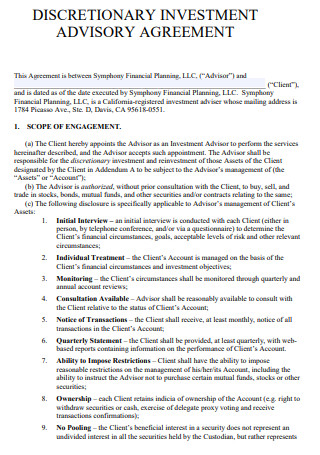
Discretionary Investment Advisory Agreement
download now -
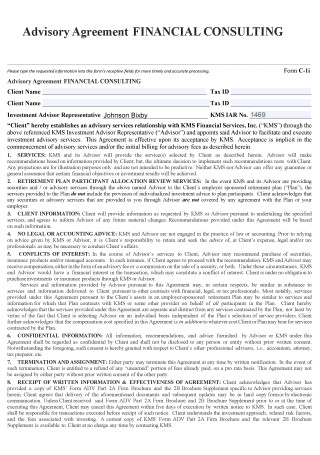
Financial Consulting Advisory Agreement
download now -
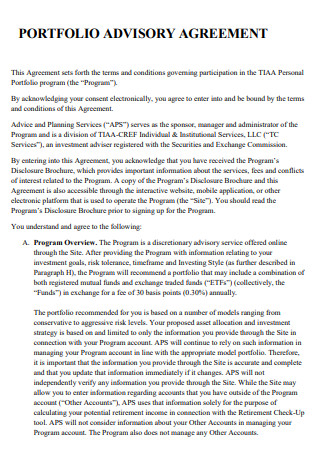
Portfolio Advisory Agreement
download now -
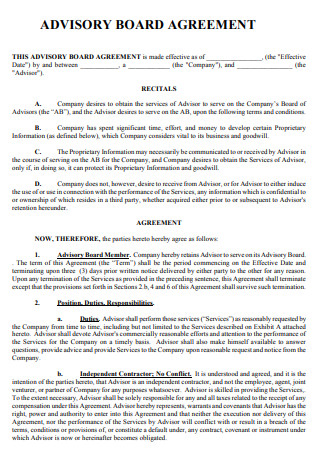
Advisory Board Agreement
download now -
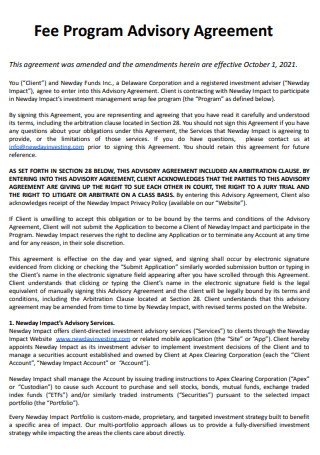
Fee Program Advisory Agreement
download now -
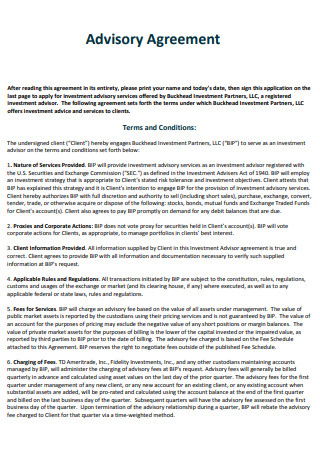
Advisory Agreement Example
download now -
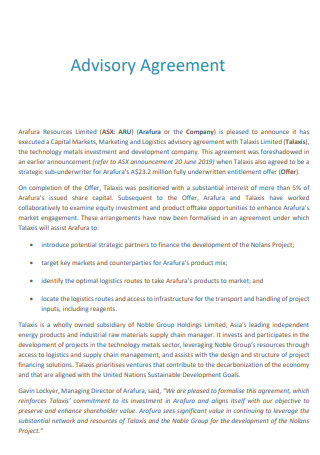
Advisory Agreement Template
download now -
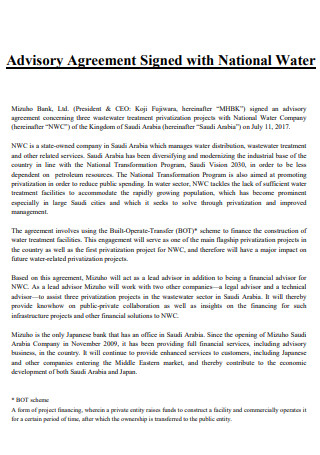
Advisory Agreement Signed with National Water
download now
FREE Advisory Agreement s to Download
36+ SAMPLE Advisory Agreement
What Is an Advisory Agreement?
What Is an Advisor?
What Are the Elements of Advisory Agreement?
What Are the 10 Important Steps in an Advisory Agreement?
FAQs
What Are Advisory Shares of Stock?
Do Advisors Get Equity?
How Do Advisors Get Paid?
Which Is Better Audit or Advisory?
The Advisory Agreement has helped many businesses in so many ways. It has been in-charge in protecting people’s rights and properties. Continue reading to know more.
What Is an Advisory Agreement?
An Advisory Agreement or also known as a Contract Agreement, is a document used to memorialize the terms and conditions of the relationship between the employer and the third-party. This agreement expands upon the services and relationship between the advisory and the company. It is essential because advisors operate under different benefits and pay compared to full time employees. Moreover, the Advisory Agreement helps new entrepreneurs and freelancers protect themselves and navigate a highly globalized economy.
Additionally, advisory management services allow private individuals to consult with investment professionals before making changes to their portfolios. Advisory management professionals have expertise in one or more investment areas and provide guidance that is tailored to an individual’s specific situation. The agreement should set forth certain key terms like confidentiality and assignment of work product. An advisory agreement should be used between a company and its advisor. The agreement creates the expectation of the relationship like work to be performed on behalf of the advisor and compensation.
What Is an Advisor?
An advisor is a person who possesses specialized knowledge, expertise and on field experience. Such a business advisor becomes a vital addition when the entrepreneur has little or no knowledge about the market and its reactions. A business advisor aids in overcoming the difficulties or challenges likely to be faced by startups. As a result of which most of the markets in current market era tend to strike a deal where in advisors are offered equity in return of the services rendered by them. The first hurdle that the entrepreneurs need have to come across is to zero in about the equity to be offered coupled with the services expected and the role of the advisor. This leads entrepreneurs to the need of an agreement between advisor and startups. It has been rightly said that agreements arose when there is a need to draw line of limitation.
What Are the Elements of Advisory Agreement?
Here is how we got to grips with the key elements of the formal advisory relationship in a way that built a relationship as well as providing the requisite legal protections:
What Are the 10 Important Steps in an Advisory Agreement?
The advisory agreement addresses the details about the equity to be offered to the advisors along with the roles that they are expected to play and the rights they will have a vis-a-vis the company. Following are 10 most essential steps in an agreement:
Step 1: Services
The services rendered by an advisor cannot be exhaustively specified or laid down in the agreement. Where a particular service is being offered, accepted, promised and delivered upon a consideration it becomes extremely difficult to draw the lines pertaining to nature and extent of services to an agreement. Advisors agree to act as an advisor for the company and extend their advisory services on matters prescribed within the agreement.
Step 2: Term and Termination
Under this particular type of agreement, it is required to mention the termination clause. Notification clause comes along and finds its place as a sub clause under term and termination clause. This clause specifies the tenure for which a business advisor is required to render service. It is important for all kinds of agreements to include lock in period so as to avoid any kind of losses. Determining the exact period will help the advisor to know the tenure for which he will be rendering the service.
Step 3: Compensation
The usual method is to seek approval of board of directors to authorize the compensation that advisor will receive. The advisor has to buy these shares at value as opposed to the premium rate fixed according to valuation that investors or other buyers have to pay. The popular choice of the day is equity-based compensation. This implies that advisor is not paid remuneration or entitled to cash compensation. Almost all startups recently have adopted this way of compensation policy and the same is mentioned in agreement.
Step 4: Expenses
This clause is generally incorporated in an agreement so as to avoid any further conflict of interest. A company has to reimburse an advisor for reasonable travel and related expenses incurred by him while working for the company. Thus comes the expense clause. This clause contains the mode and manner in which expenses have to be reimbursed to a business advisor. It is also to be noted that this clause also lays down the limit of reimbursement so as to bring reasonableness from part of company as well as advisor.
Step 5: Confidentiality
Information in wrong hands and at unfortunate times can be deadly and cause severe losses to an entity. The term confidentiality is a set of rules or a promise that limits the access or places restrictions on certain types of information pertaining to sensitive information such as technical data or know-how (whether disclosed before or after signing the advisory agreement) including but not limited to, information relating to business, products, manufacture process, trade, research, designs, process, drawings, marketing or any other information which under certain conditions or circumstances appear to be confidential.
Step 6: Nature of Relation
An advisor in no manner is an employee of the company; neither the advisor assumes the nature of service provider or a shareholder who holds sweat equities. It is extremely important to draw an outline and limitations defining the nature of relationship. This avoids the tussle over the claims that may arise when advisor claims in another capacity or when company turns around and starts treating the advisor in a manner which is likely to be contrary to conditions specified in agreement.
Step 7: Intellectual Property
Intellectual property is a legal concept which refers to knowledge, techniques, writings, and images that are intangible but often protected by law via patents, copyrights, and trademarks. It is important to expressly lay down the rights vested in advisor in dealing with the assets of the company which includes intellectual property. Along with the agreement of confidentiality, the advisory agreement should also emphasize on the intellectual properties developed by the advisor or through his advice. It is to be noted that the advisor has access to the intellectual property of the company as long as he is in connection with advisory services rendered to the company. Thus, this particular clause emphasizes the extent to which advisor has right over aforementioned properties of the company.
Step 8: Dispute Resolution
The Court through various precedents have emphasized on adding arbitration and other alternate dispute resolution methods such as negotiation and mediation in an agreement. The existences of such clauses have become a necessary concomitant in all bilateral agreements in the field of business. It aims at speedy settling of disputes and avoids heavy litigation cost and long time-consuming process involved in the court of law.
Step 9: Governing Law and Jurisdiction
It is expedient to mention the laws that were or are applicable to when the agreement was entered into. It is necessary to add in clear and plain terms the governing law as well as the jurisdiction within of the court where the parties intend to pursue the case in case the arbitration fails or is not opted for. It is important to note here that the apex court through various precedents has established that use of words and expression such as the dispute resolution mechanism, governing law as well as jurisdiction are important clauses in an agreement.
Step 10: Conflict of Interest
The advisory agreement specifies the duties and the rights of advisor in relation to his dealings with the company. This is done to avoid unnecessary conflict. It is the duty of the advisor to make a disclosure before the company immediately when he is himself working with any competing business or company. To understand this concept let us take an example, where an advisor is asked to be part of the company which is prime competitor of already engaged business or company. Such a situation may put the interest of both the companies in jeopardy. After such a disclosure is put forward by advisor the company shall put it under review as to whether the advisor`s working with such a competitor company is in conflict with the interests of the company.
FAQs
What Are Advisory Shares of Stock?
Rather than giving up capital, new companies entice advisors to offer guidance while incentivizing them to help it grow over time per a pre-determined vesting schedule. Advisory shares are an advantageous equity arrangement between start-ups and business experts.
Do Advisors Get Equity?
Depending on the stage of the startup and the nature of the advice provided, an advisor may receive between 0.25% and 1% of shares. There are many ways to structure such compensation to make sure that founders get value for those shares while retaining the flexibility to replace advisors without losing equity.
How Do Advisors Get Paid?
There are three ways financial advisors get paid: Fee-only advisors charge an annual, hourly or flat fee. Fee-based advisors earn a combination of a fee and commissions. Commission-based advisors are paid through the investments they sell.
Which Is Better Audit or Advisory?
Audit teaches a ton in the first few years and gives a very solid understanding of how businesses work, but advisory will provide better exit opportunities in the long run—especially if there have been a few years of audit on the resume before transferring to the advisory.
It is crucial to state that the agreement is the only complete understanding between the parties to make it supersede all prior oral or written understanding or agreements. Moreover, in case of any dispute or disagreement, it is advisable to insist for Arbitration proceedings and limit the proceeding expenses thereof. This can be worked out by appointment of arbitrator having industry expertise and putting cap on the final and total cost of arbitration proceedings. Also, the arbitration proceedings can be faster compared to court proceedings which usually take longer time. Lastly, the agreement has to be executed by the parties to agreement having authority to execute the agreement.
